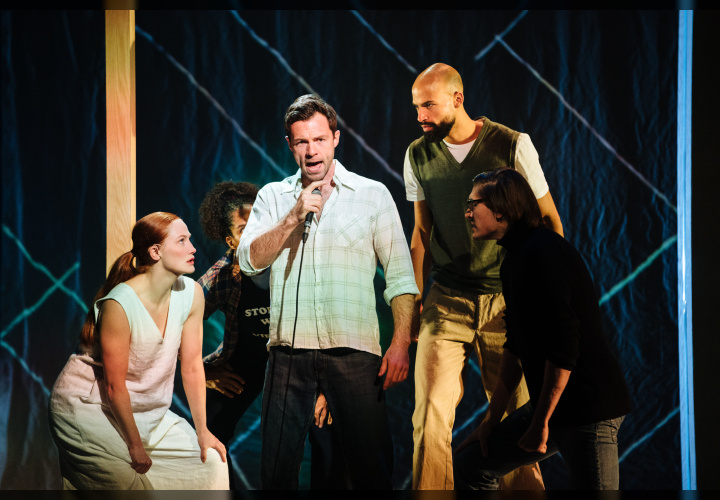Wilton’s Music Hall, London – until 12th November, then Warwick Arts Centre
Reviewed by Alun Hood
2**
Science fiction is a difficult genre to pull off in the theatre. There’s something about the warm immediacy of live performance that is anathema to the chilly mechanics of futuristic fantasy. The distance that the screen lends, along with (usually) drastically bigger production budgets, tends to mitigate against the more risible aspects of stories set in an almost unimaginable, frequently unrelatable alternative universe. When it works on stage, it tends to be either as musical comedy (Return To The Forbidden Planet, We Will Rock You) or, as in the recent Yard version of The Cherry Orchard set on a failing spaceship, underpinned by a rock solid, and already familiar, set of characters and circumstances. Even the usually brilliant Mike Bartlett came unstuck, in his 2010 National Theatre epic Earthquakes In London, where the portions set far in the future somewhat undermined what was elsewhere a searing, multi-layered family drama.
David Farr’s new play, briefly in London following performances in Bristol and Plymouth and before moving on to Warwick, is an earnest addition to an underpopulated genre. Undeniably ambitious, but more ponderous than engaging, it doesn’t make a great case for creating stage dramas in this mould. The premise is interesting enough: damaged, disenfranchised Sam (Gemma Lawrence, investing the character with more inner life than the writing might suggest) is summoned to New Mexico to identify the body of her estranged mother Kath, only to discover herself confronted with a robotic avatar of the deceased, the creation of ‘Future Life’, a glossy but shady biotech company “questing to take humanity into the third millennium”.
The play interrogates the nature of grief, what the ending of life really means, monetary greed and family dynamics, and does so in a series of flashbacks showing Kath’s earlier life as a rebellious artist and student protestor in 1960s America, then, somewhat improbably, as a 1970s London punk and, even less believably, a power-suited 1980s big business go-getter. Eve Ponsonby inhabits each iteration with considerable verve but is fighting a losing battle against a turgid, clichéd script. She also has to maintain extensive portions of the play as Katy’s dead-eye, monotoned avatar, who is hardly what one could call interesting theatrical company, but at least isn’t unintentionally funny, which she could be in less skilled hands.
Splicing together sci-fi with a potted history of 20th century social movements and fashions, is unusual and intriguing, but when each section is so eye-rollingly unoriginal, and all the characters so resolutely unsympathetic, it becomes difficult to engage. The dialogue is serviceable but seems calculated more to hammer home Farr’s ideas than to illuminate the people and situations in his story.
Rachel Bagshaw’s production doesn’t help much. It has tremendous energy for the most part, but misses a trick in it’s constant use of Sarah Readman’s excellent video designs that exhilaratingly conjure up the trashing of a work of art, or Kath’s fevered creation of a painting, but might equally have been useful in providing indications as to the ever-changing locales and time periods. Instead though, the visual aesthetic remains resolutely abstract, even though it looks rather elegant, and a bewildering text and uninvolving characters remain out of reach. A subplot involving a terminal illness for Leo, the only man Kath really ever loved (played with hangdog good humour by David Burnett), is introduced too late in the play to carry any real tragic weight.
The final image, involving a rapprochement of sorts between mother, daughter and Leo, feels as though it is straining for some sort of catharsis, or at least bleak acceptance, but crowns an overlong story too elliptical and lacking in emotional engagement to provoke much more than relief at getting out of the theatre. Hugely disappointing.

